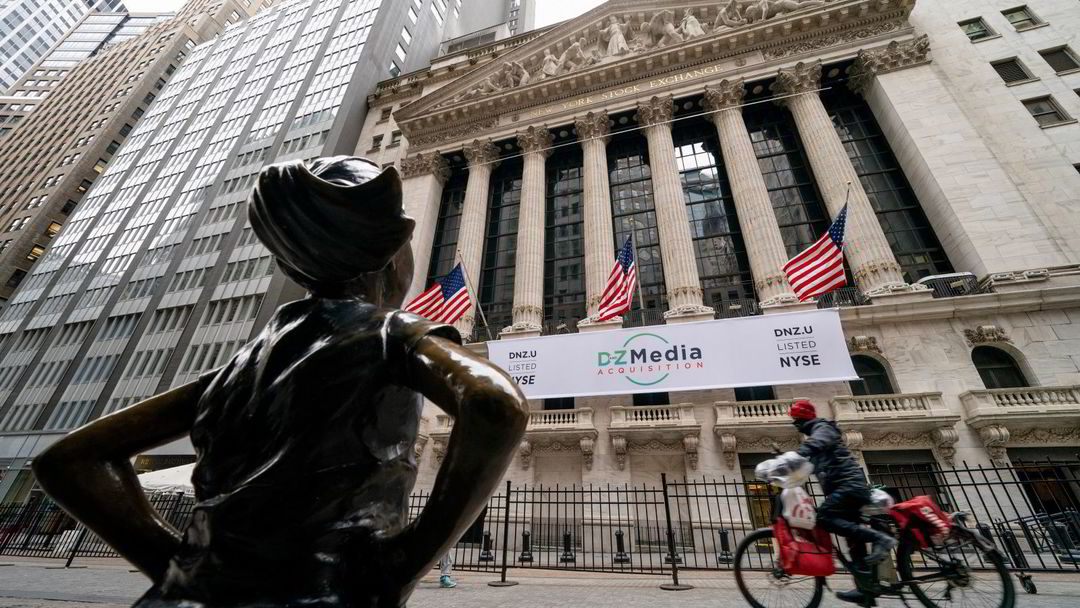The US stock markets opened slightly higher on Friday, but the mood soon soured, especially after the Republicans announced that they needed a break in the negotiations on the debt ceiling. This means that the chances of a solution during the weekend are dwindling.
This is how the most important indices ended before investors took the weekend:
- The S&P 500 ended down 0.15 percent.
- The Dow Jones Industrial Average ended down 0.33 percent.
- The Nasdaq Composite was down 0.24 percent.
In corporate news, shares in investment bank Morgan Stanley fell 2.65 percent after chief executive James Gorman announced plans to step down next year. The shoe chain Footlocker collapsed 27.25 percent after disappointing quarterly figures and negative prospects going forward. Deere, which manufactures agricultural machinery, fell 1.88 percent even though the company announced improvement and increased sales going forward.
Best since March
Despite the fall on Friday, this means that both the S&P 500 and the Nasdaq had their best week since March this year, with a total rise of 1.65 and 3.04 per cent respectively.
The most significant of the rise came on Wednesday and Thursday, after US President Joe Biden said he was confident the US would not default, while House Speaker Kevin McCarthy said there was a “structure to find a way to agreement”.
As long as a solution is put in place before June 1 or thereabouts, what Christian Lie in Formue has characterized as a “complete disaster” is avoided – a default on what is considered the most risk-free investment in the world, US government debt.
Agreement perhaps as early as next week
McCarthy hinted Thursday that the two parties may have reached an agreement on a solution to the debt ceiling as soon as next week, according to CNBC.
From Japan on Friday morning, Biden also reiterated that he was confident that Congress would ensure that defaults were avoided.
Otherwise, the trading day offers few macro figures, and no quarterly figures from large companies either, but Fed chief Jerome Powell will take part in a panel debate later on Friday in which former US central bank chief Ben Bernanke will also take part.
Tysk all-time high
The good mood on Wall Street comes after the stock markets in both Europe and here at home rose significantly on Friday. At the opening of the stock exchange in the USA, Oslo Børs was expected to rise by around 0.9 per cent after the price of oil had climbed 1.6 per cent since midnight.
In Germany, at the same time, it looks like the leading DAX index will close at an all-time high, as France’s CAC 40 and Britain’s FTSE 100 have done earlier this year.
The DAX index rises by around 0.7 per cent, thus sniffing levels last seen at the end of January last year.
Bloomberg points to quarterly figures that have steadily come in better than feared, falling energy prices and traction from a Chinese economy that is increasingly opening up shop after almost three years of corona closures.
Rheinmetall AG, a supplier of car parts and defense equipment, Siemens Energy, Adidas and the software company SAP are among the stock exchange locomotives that have pulled the load in the German stock market.
Recommends selling US stocks
So far this year, the S&P 500, Dow Jones and Nasdaq Composite are up 9.3, 1.3 and 21.4 per cent respectively. After a sour 2022, the big tech companies in particular have done well on the stock market in 2023 – but Bank of America strategist Michael Hartnett takes this rather as a sign of a bubble about to be inflated.
Hartnett and his department therefore recommend selling American shares, write Bloomberg.
He points to all the hype about artificial intelligence as a sign that the sector is in a kind of “baby bubble”, and emphasizes that previous bubbles have always started with “free money” and have ended when interest rates have risen.
Hartnett points to the lessons learned from the dotcom bubble back in 1999, where the combination of a steep rise in Internet stocks and strong macro economic numbers prompted the Fed to tighten monetary policy – with the result that the bubble burst nine months later.
Hartnett also warns that the Fed may still not be finished with the interest rate increases, quite contrary to what is being priced into the market. He advocates that interest rates on US bonds could climb to over four per cent, should the Fed pause interest rate increases by some sort of mistake.
– And in that case, we have certainly not seen the latest interest rate increase from the Fed this time around, Hartnett’s department wrote in a memo on Friday.
The interest rate on ten-year US government debt hovers around 3.6 per cent on Friday, having risen markedly as the debt ceiling drama has intensified.(Terms)Copyright Dagens Næringsliv AS and/or our suppliers. We would like you to share our cases using links, which lead directly to our pages. Copying or other forms of use of all or part of the content may only take place with written permission or as permitted by law. For further terms see here.
2023-05-19 20:47:25
#Decline #Wall #Street #Bank #America #strategist #recommends #selling #stocks


